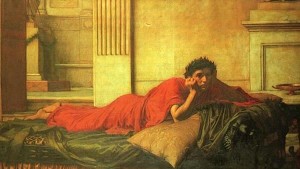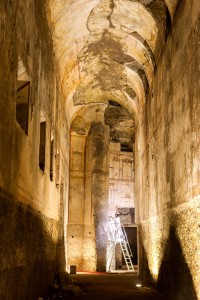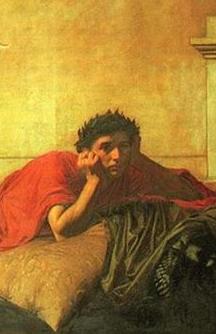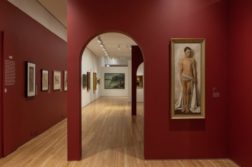Who was Rome’s gayest Emperor? That’s a tough one. There were rumors about almost every Emperor: Julius Caesar’s soldiers for instance joshingly called him “the husband of  every wife and the wife of every husband.” One of the top competitors, however, is certainly Nero, who was said among other things to have married two of his male slaves: supposedly he had one, named Sporus, castrated and married him; on the other hand, he played the bride in a marriage to his slave Doryphorus (and made the new bride’s traditional cries and moans in the night to show that he was losing his virginity!). As a careful historian, I have to say that I take these rumors about the Caesars with many grains of salt: just think of the things people say about modern politicians, and multiply by 10. But the rumors themselves, aside from being colorful, *are* gay history. And certainly Nero was considered a wild and scandalous person.
every wife and the wife of every husband.” One of the top competitors, however, is certainly Nero, who was said among other things to have married two of his male slaves: supposedly he had one, named Sporus, castrated and married him; on the other hand, he played the bride in a marriage to his slave Doryphorus (and made the new bride’s traditional cries and moans in the night to show that he was losing his virginity!). As a careful historian, I have to say that I take these rumors about the Caesars with many grains of salt: just think of the things people say about modern politicians, and multiply by 10. But the rumors themselves, aside from being colorful, *are* gay history. And certainly Nero was considered a wild and scandalous person.
 The Golden House
The Golden House
And luckily, these days we can visit the ruins of the overdone palace he built in Rome, so we can get an idea of why the Romans saw him this way. The palace was called the Golden House, and it stretched between three of Rome’s seven hills, centering on a great lake in the valley where the Colosseum stands. Nero had it built on the burn area of the great fire of 64 AD—which is presumably why people came to believe that he started the fire (speaking of how rumors get started). The palace had amazing Vegas-like features, including a revolving dining room, and the following Emperors, in an attempt to show that they were “men of the people” tore the whole thing down, covered it over with dirt and built more prosocial things in its place, like public baths and the great arena. Luckily they thereby preserved a great deal of the palace, which was rediscovered in the Renaissance and yielded many famous artworks, such as the Vatican Museum’s Laocoon. The underground ruin, with other ruins on top of it, plus trees etc., has always however been in danger of collapsing, and it has often been closed over the years. But luckily, a great new effort is being made to preserve the Golden House, and it is open to the public, so it will be one of the highlights of Oscar Wilde Tours’ gay history tour of Italy.
Check out this article about the preservation of the palace, and think about coming on our gorgeous and fascinating tour, designed to show what we mean by our motto, “Traveling through Gay History.”
The above article was originally published on Oscar Wilde Tours blog in August.







Discussion1 Comment
As portrayed by actor Jay Robinson in “The Robe” and “Demetrius and The Gladiators”, Nero was – alarmingly – gay.